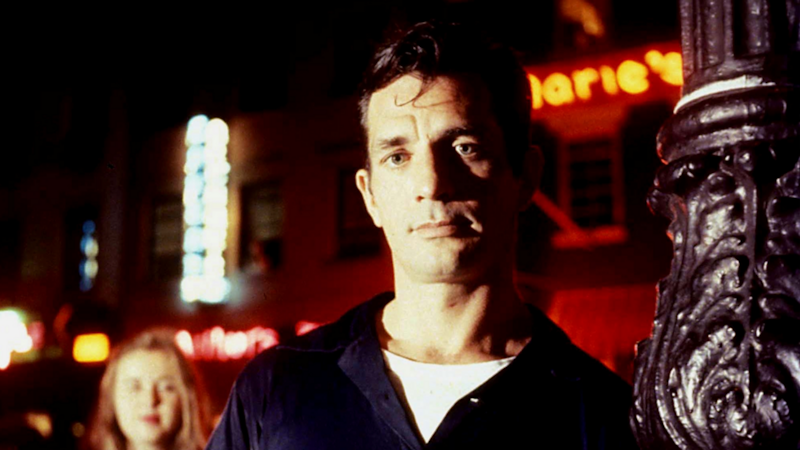A new documentary, Kerouac’s Road: The Beat of a Nation, arrives with noble intent but is filled with the same old blind spots. Director Ebs Burnough gathers an impressive cast—W. Kamau Bell, Jay McInerney, Natalie Merchant—to re-examine Jack Kerouac’s legacy. The film’s strong when it stays close to On the Road, but frustrates when it tries to make Kerouac a mouthpiece for modern wanderers. Like so many before it, it sidesteps the sacred. To speak of Kerouac without speaking of Catholicism is like discussing Hunter S. Thompson without mentioning the drugs—it ignores the bloodstream of his art.
The so-called patron saint of restless youth was first a servant of another faith. Born in 1922 to French-Canadian immigrants in Lowell, Massachusetts, he grew up amid incense and saints. He served as an altar boy, studied under Jesuits, and prayed in French beside his mother, Gabrielle, who clutched her rosary like a lifeline. Though Kerouac later drifted from the pews, the cadence of the Mass lingered in his prose. In truth, its echoes hum beneath every line he ever wrote.
Douglas Brinkley, who edited Kerouac’s diaries, noted that nearly every page carried a sketch of the Cross or a reference to Christ. When a Paris Review interviewer claimed he never wrote about Jesus, Kerouac barked back: “All I write about is Jesus.” Beneath the jazz and the jive, beneath the road trips and restlessness, lay the language of confession.
Most readers missed it. They saw speed and sin, not scripture. They mistook the “Beat” for burnout, not for something blessed. But Kerouac knew the word’s deeper meaning. He coined it while kneeling in his old parish church, struck by the thought that his generation, poor in spirit yet hungry for a higher purpose, was still worthy of blessing.
That realization gave On the Road its soul. It wasn’t simply a hymn to freedom but a modern pilgrimage. Sal Paradise and Dean Moriarty were chasing thrills, but they were also chasing truth. Not in the factual sense but the existential one. The kind of truth you don’t find in lectures, but in motion, in risk, in exhaustion. For Kerouac, that was the real frontier—not the road beneath the wheels, but the inner road that tested belief, loneliness, and grace. Each dusty highway, each jazz bar, each sunrise became a kind of liturgy. The pursuit of the divine hidden in the dirt.
What set him apart was reverence. He treated the ordinary as extraordinary. He could find the sacred in a neon diner or a beer-stained sidewalk. He prayed through prose and made holiness feel alive again. At a time when religion was cast off like an old coat, when young Americans were trading confession for cocktails and sanctuaries for bars, Kerouac gave Catholicism an edge, a pulse, a poetry that stood apart from both the counterculture. While others mocked ritual as repression, he saw in it pattern and purpose. He didn’t sermonize; he romanticized. In doing so, he made Catholicism cool. Not by softening it, but by showing that the sacred could still burn in a secular age.
He admired St. Thérèse of Lisieux, whose “Little Way” revealed that holiness could dwell in the smallest acts, if done with love. Her humility spoke to him. He read St. Francis of Assisi and Thomas Merton not as distant mystics but as companions on the same inward journey, men who sought God through devotion rather than doctrine. Even in his fascination with Buddhism, his outlook remained unmistakably Catholic. Suffering became an offering, stillness a form of prayer. His spiritual synthesis was not rebellion but continuity, the natural progression of a man who never stopped seeing the world through stained glass. What others called contradiction, Kerouac called communion. The meeting of faith and flesh, discipline and desire, East and West, all bound by a single yearning for transcendence.
His politics flowed from that same well. While his peers leaned left, Kerouac kept his compass fixed. He supported William F. Buckley Jr., subscribed to National Review, and condemned the “Castro-jacketed New Left.” When Allen Ginsberg wrapped himself in the American flag at a party, Kerouac folded it neatly and set it aside. “The flag is not a rag,” he said. In an age drunk on defiance, he remained steady—moral, patriotic, and quietly devout.
The counterculture crowned him king, but he never wanted the crown. “I’m not a Beatnik,” he told reporters. “I’m a Catholic.” That single line should be etched on his grave. It explains everything.
In his final months, Kerouac returned to the short Marian prayers of his youth. He slipped into churches to seek forgiveness for the wreckage of his excess. He died at 47 from a hemorrhage brought on by years of heavy drinking. His funeral Mass, held at St. Jean Baptiste in Lowell, was led by Father Armand Morissette, who compared his journey to the Road to Emmaus: “Wasn’t it like a fire burning in us when he talked to us on the road?”
Kerouac’s Road may map his travels, but it misses the destination. Like much modern commentary on the Beats, it treats mysticism as mood. It wants depth without doctrine, transcendence without theology. But Kerouac’s power came from his refusal to separate art from altar. The road was less an escape than a return to what first gave his life meaning. And for all his faults, he showed a generation that belief could still wander and wonder without losing its way.

